Anpassungsfähigkeit und Resilienz des Finanzsystems
Diese Forschungsgruppe untersucht kritische Aspekte der Anpassungsfähigkeit und Widerstandsfähigkeit von Finanzsystemen. Sie analysiert die Auswirkungen von Naturkatastrophen auf Finanzsysteme, die Auswirkungen politischer Präferenzen für die grüne Transformation und die Bedeutung von Kultur in den Volkswirtschaften.
Forschungscluster
Finanzresilienz und RegulierungIhr Kontakt

Mitglied - Abteilung Finanzmärkte
PROJEKTE
07.2016 ‐ 12.2018
Relationship Lenders and Unorthodox Monetary Policy: Investment, Employment, and Resource Reallocation Effects
Leibniz-Gemeinschaft
We combine a number of unique and proprietary data sources to measure the impact of relationship lenders and unconventional monetary policy during and after the European sovereign debt crisis on the real economy. Establishing systematic links between different research data centers (Forschungsdatenzentren, FDZ) and central banks with detailed micro-level information on both financial and real activity is the stand-alone proposition of our proposal. The main objective is to permit the identification of causal effects, or their absence, regarding which policies were conducive to mitigate financial shocks and stimulate real economic activities, such as employment, investment, or the closure of plants.
01.2015 ‐ 12.2019
Interactions between Bank-specific Risk and Macroeconomic Performance
Deutsche Forschungsgemeinschaft (DFG)
Referierte Publikationen

Crossing Networks Competition and Design
in: Competition and Regulation in Network Industries, Nr. 4, 2006
Abstract
In the past two decades, Alternative Trading Systems (ATSs) started to compete with traditional exchanges. Our paper focuses on one such system: a Crossing Network (CN). First, we discuss the distinct institutional aspects a CN offers compared to traditional markets. Next, we present an overview of the theoretical and empirical literature analyzing their success in competing with traditional markets. Finally, we offer some prospects on the potential outcome of this competition, taking into account market design issues such as the optimal degree of transparency of CNs. We also provide a market practioner’s view on the market design of CNs.
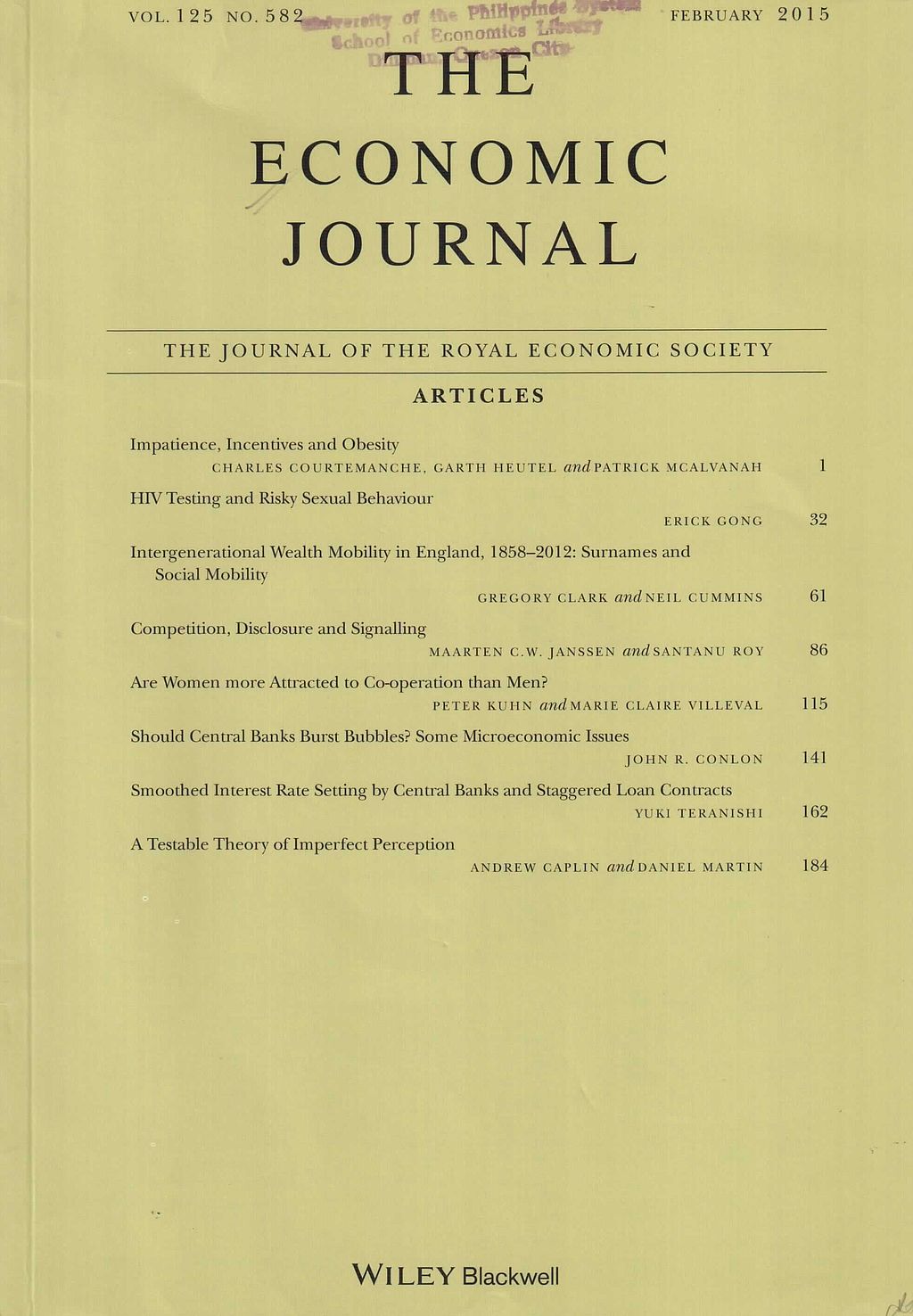
Entry and Strategic Information Display in Credit Markets
in: Economic Journal, Nr. 513, 2006
Abstract
In many countries, lenders voluntarily provide information about their borrowers to private credit registries. A recent World Bank survey reveals that the display of a lender's own borrower information is often not reciprocated. That is, access to these registries does not require the prior provision of proprietary data. We argue that incumbent lenders release information about a portion of their profitable borrowers for strategic reasons. The reasoning is that the pool of unreleased borrowers becomes characterised by a severe adverse selection problem. This prevents the entrants from bidding for all the incumbent's profitable borrowers and reduces their scale of entry.

Investment and Internal Finance: Asymmetric Information or Managerial Discretion?
in: International Journal of Industrial Organization, Nr. 1, 2006
Abstract
This paper examines the investment-cash flow sensitivity of publicly listed firms in The Netherlands. Investment-cash flow sensitivities can be attributed to overinvestment resulting from the abuse of managerial discretion, but also to underinvestment due to information problems. The Dutch corporate governance structure presents a number of distinctive features, in particular the limited influence of shareholders, the presence of large blockholders, and the importance of bank ties. We expect that in The Netherlands, the managerial discretion problem is more important than the asymmetric information problem. We use Tobin's Q to discriminate between firms with these problems, where LOW Q firms face the managerial discretion problem and HIGH Q firms the asymmetric information problem. As hypothesized, we find substantially larger investment-cash flow sensitivity for LOW Q firms. Moreover, specifically in the LOW Q sample, we find that firms with higher (bank) debt have lower investment-cash flow sensitivity. This finding shows that leverage, and particularly bank debt, is a key disciplinary mechanism which reduces the managerial discretion problem.

Aggressive Orders and the Resiliency of a Limit Order Market
in: Review of Finance, Nr. 2, 2005
Abstract
We analyze the resiliency of a pure limit order market by investigating the limit order book (bid and ask prices, spreads, depth and duration), order flow and transaction prices in a window of best limit updates and transactions around aggressive orders (orders that move prices). We find strong persistence in the submission of aggressive orders. Aggressive orders take place when spreads and depths are relatively low, and they induce bid and ask prices to be persistently different after the shock. Depth and spread remain also higher than just before the order, but do return to their initial level within 20 best limit updates after the shock. Relative to the sample average, depths stay around their mean before and after aggressive orders, whereas spreads return to their mean after about twenty best limit updates. The initial price impact of the aggressive order is partly reversed in the subsequent transactions. However, the aggressive order produces a long-term effect as prices show a tendency to return slowly to the price of the aggressive order.

Distance, Lending Relationships, and Competition
in: Journal of Finance, Nr. 1, 2005
Abstract
We study the effect on loan conditions of geographical distance between firms, the lending bank, and all other banks in the vicinity. For our study, we employ detailed contract information from more than 15,000 bank loans to small firms comprising the entire loan portfolio of a large Belgian bank. We report the first comprehensive evidence on the occurrence of spatial price discrimination in bank lending. Loan rates decrease with the distance between the firm and the lending bank and increase with the distance between the firm and competing banks. Transportation costs cause the spatial price discrimination we observe.
Arbeitspapiere
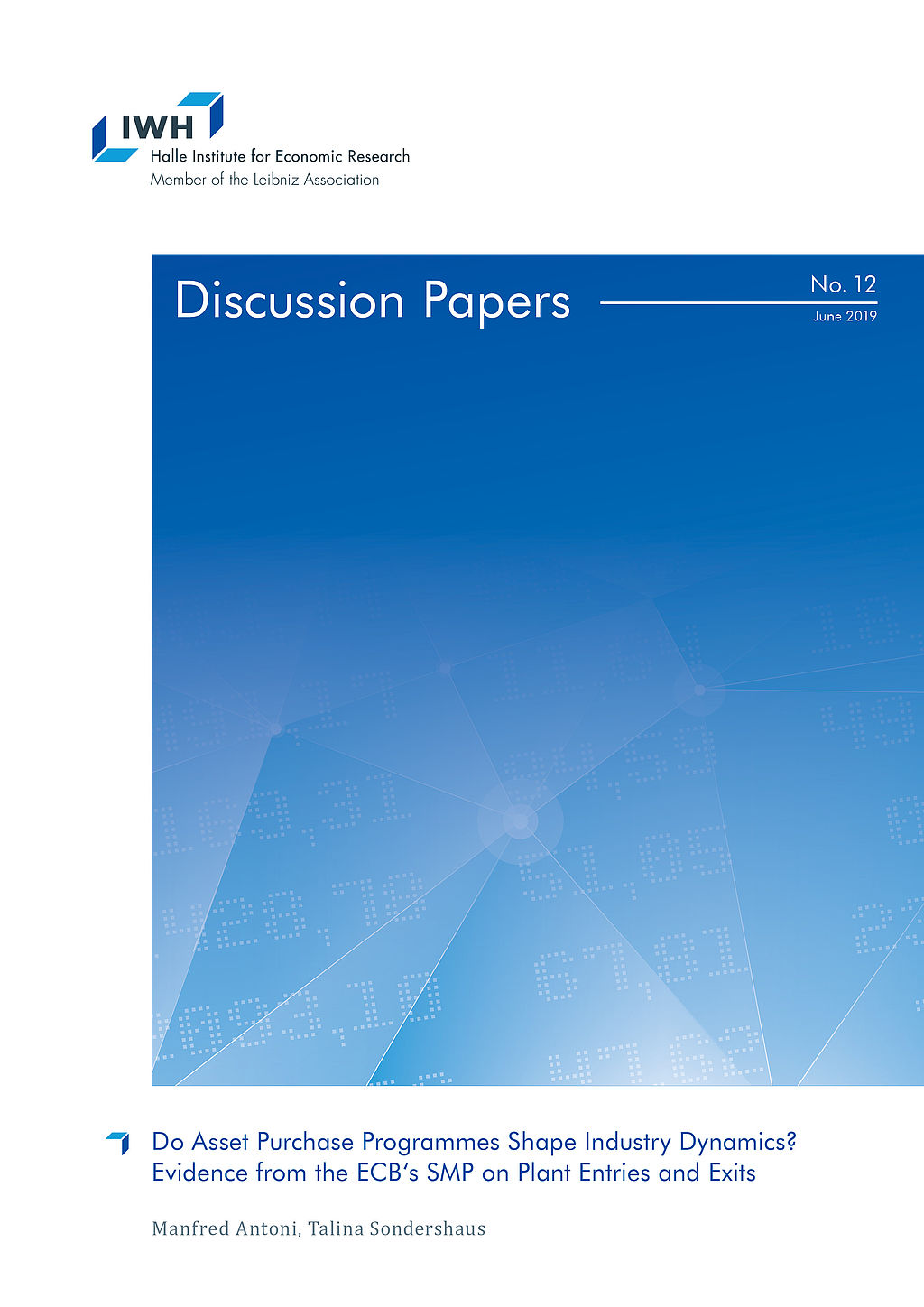
Do Asset Purchase Programmes Shape Industry Dynamics? Evidence from the ECB's SMP on Plant Entries and Exits
in: IWH Discussion Papers, Nr. 12, 2019
Abstract
Asset purchase programmes (APPs) may insulate banks from having to terminate relationships with unproductive customers. Using administrative plant and bank data, we test whether APPs impinge on industry dynamics in terms of plant entry and exit. Plants in Germany connected to banks with access to an APP are approximately 20% less likely to exit. In particular, unproductive plants connected to weak banks with APP access are less likely to close. Aggregate entry and exit rates in regional markets with high APP exposures are also lower. Thus, APPs seem to subdue Schumpeterian cleansing mechanisms, which may hamper factor reallocation and aggregate productivity growth.
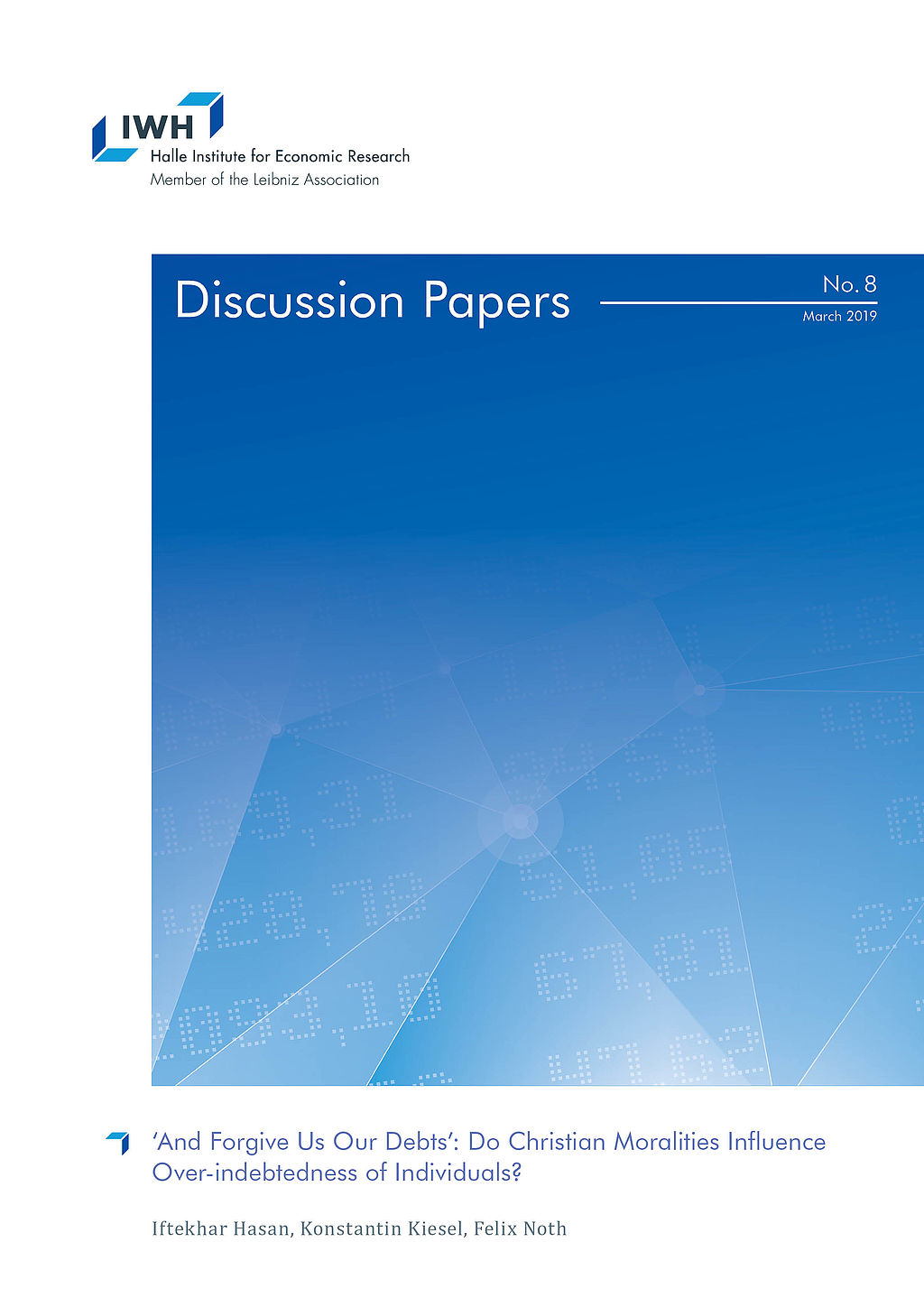
‘And Forgive Us Our Debts’: Do Christian Moralities Influence Over-indebtedness of Individuals?
in: IWH Discussion Papers, Nr. 8, 2019
Abstract
This paper analyses whether Christian moralities and rules formed differently by Catholics and Protestants impact the likelihood of households to become overindebted. We find that over-indebtedness is lower in regions in which Catholics outweigh Protestants, indicating that Catholics‘ forgiveness culture and a stricter enforcement of rules by Protestants serve as explanations for our results. Our results provide evidence that religion affects the financial situations of individuals and show that even 500 years after the split between Catholics and Protestants, the differences in the mind-sets of both denominations play an important role for situations of severe financial conditions.
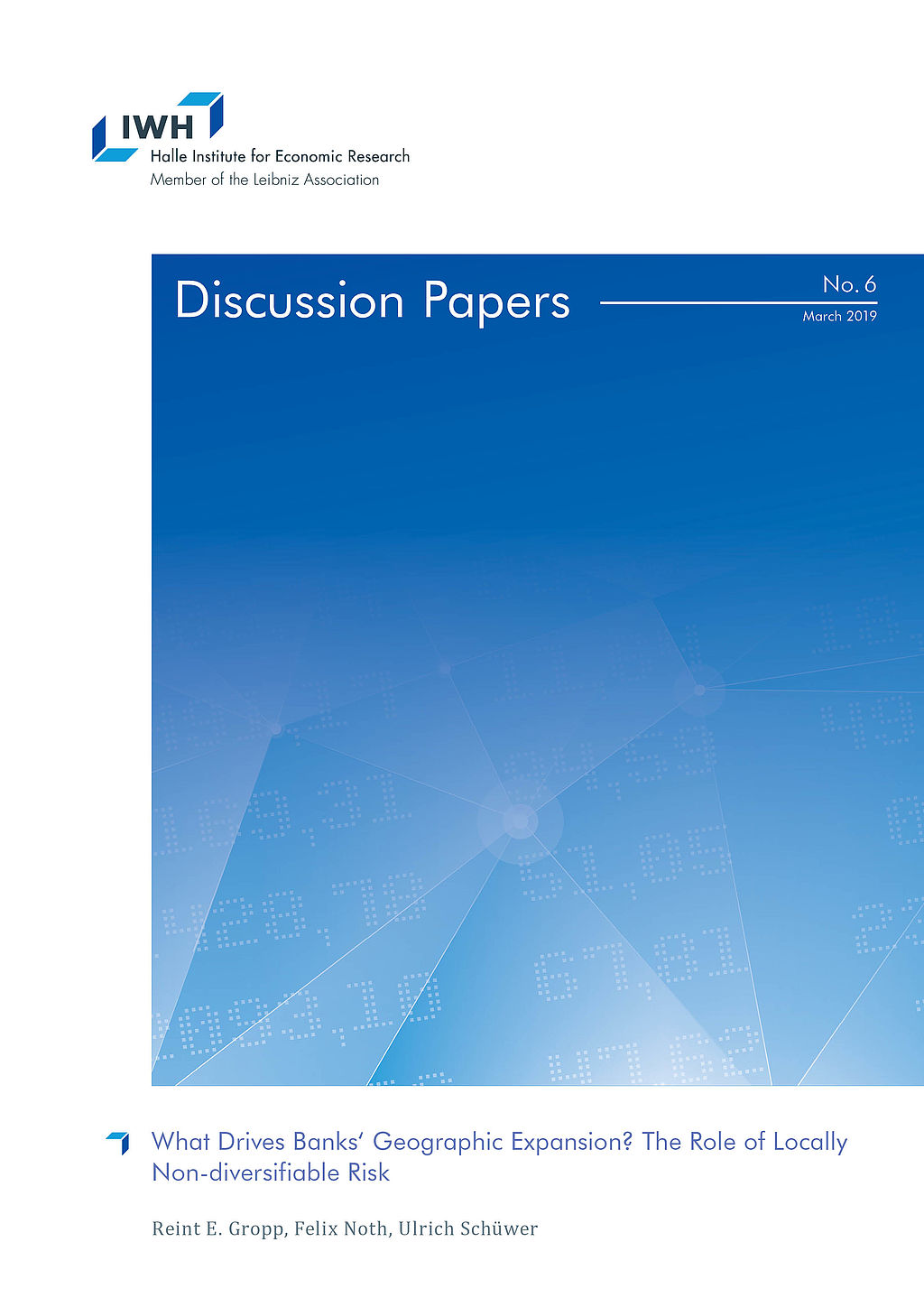
What Drives Banks‘ Geographic Expansion? The Role of Locally Non-diversifiable Risk
in: IWH Discussion Papers, Nr. 6, 2019
Abstract
We show that banks that are facing relatively high locally non-diversifiable risks in their home region expand more across states than banks that do not face such risks following branching deregulation in the 1990s and 2000s. These banks with high locally non-diversifiable risks also benefit relatively more from deregulation in terms of higher bank stability. Further, these banks expand more into counties where risks are relatively high and positively correlated with risks in their home region, suggesting that they do not only diversify but also build on their expertise in local risks when they expand into new regions.
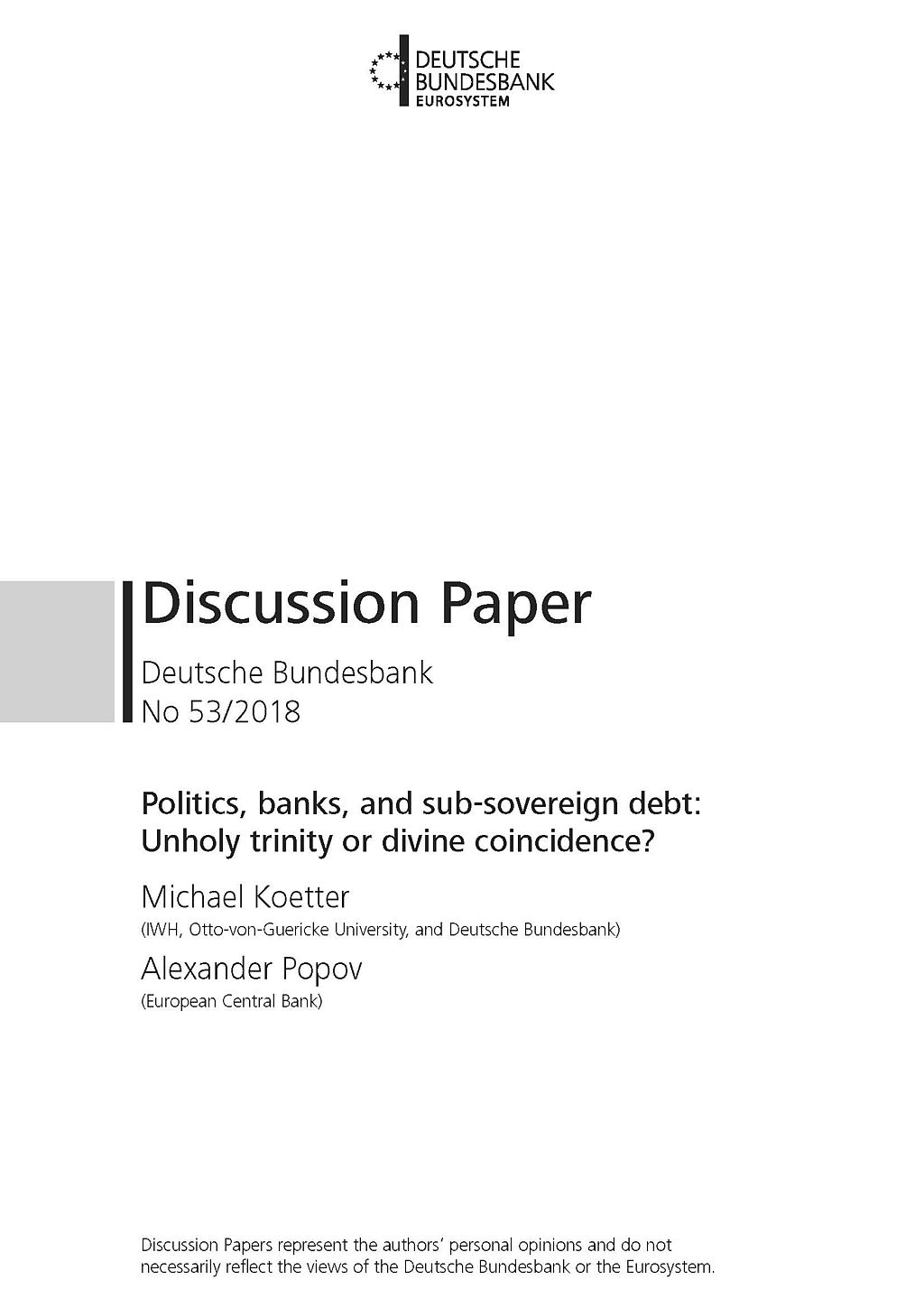
Politics, Banks, and Sub-sovereign Debt: Unholy Trinity or Divine Coincidence?
in: Deutsche Bundesbank Discussion Paper, Nr. 53, 2018
Abstract
We exploit election-driven turnover in State and local governments in Germany to study how banks adjust their securities portfolios in response to the loss of political connections. We find that local savings banks, which are owned by their host county and supervised by local politicians, increase significantly their holdings of home-State sovereign bonds when the local government and the State government are dominated by different political parties. Banks' holdings of other securities, like federal bonds, bonds issued by other States, or stocks, are not affected by election outcomes. We argue that banks use sub-sovereign bond purchases to gain access to politically distant government authorities.

May the Force Be with You: Exit Barriers, Governance Shocks, and Profitability Sclerosis in Banking
in: Deutsche Bundesbank Discussion Paper, Nr. 49, 2018
Abstract
We test whether limited market discipline imposes exit barriers and poor profitability in banking. We exploit an exogenous shock to the governance of government-owned banks: the unification of counties. County mergers lead to enforced government-owned bank mergers. We compare forced to voluntary bank exits and show that the former cause better bank profitability and efficiency at the expense of riskier financial profiles. Regarding real effects, firms exposed to forced bank mergers borrow more at lower cost, increase investment, and exhibit higher employment. Thus, reduced exit frictions in banking seem to unleash the economic potential of both banks and firms.


















